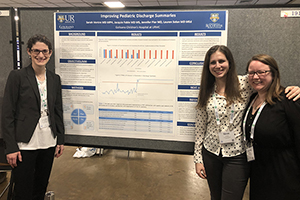Curriculum
Core Curriculum
Fellows will have experiences in the full spectrum of general pediatric inpatient medicine, including the care of newborns, children with complex chronic conditions, children with surgical problems and palliative care services. Specifically, the fellowship curriculum consists of required rotations in the newborn nursery and the pediatric intensive care unit, where fellows will have experiences in the care of newborn infants and the performance of procedural sedation, respectively.
As part of the pediatric hospital medicine rotations, fellows will gain an in-depth understanding and appreciation for the challenges faced by children with complex chronic conditions. These rotations will occur longitudinally throughout the fellowship so that fellows will build on skills learned previously and will be able to competently provide care for and coordinate the multi-disciplinary services for these children.
 First year fellows will initially do one month of PHM at the start of their fellowship in order to provide as much early patient exposure and education as possible and strengthen their skills, independence, and confidence in clinical care responsibilities. Each rotation (with the exception of vacation) will be a minimum of 2 weeks in length to accomplish the same goals. This includes research experiences as well, so that the fellows can be productive in their research endeavors for a 2-week period, uninterrupted with clinical responsibilities.
First year fellows will initially do one month of PHM at the start of their fellowship in order to provide as much early patient exposure and education as possible and strengthen their skills, independence, and confidence in clinical care responsibilities. Each rotation (with the exception of vacation) will be a minimum of 2 weeks in length to accomplish the same goals. This includes research experiences as well, so that the fellows can be productive in their research endeavors for a 2-week period, uninterrupted with clinical responsibilities.
During the second year, fellows earn increased autonomy in clinical responsibility as training progresses, with ample supervision, guidance, and support. Fellows spend the majority of time in clinical and/or non-clinical electives and also continue to have dedicated research months. At the completion of fellowship, our trainees demonstrate independent ability in patient care, establish fundamental skills in research and quality improvement, and are able to lead a multidisciplinary team while serving as a role model and educator.
Community Experience
The fellows’ community experience will occur at Rochester General Hospital (RGH) in the first year. RGH is a large urban tertiary hospital with a pediatric inpatient unit. The pediatric hospital medicine service provides care for children ages 0-21 years of age, including both medical and surgical patients. The pediatric hospital medicine team consists of a senior pediatric or medicine/pediatric resident, a pediatric or family medicine intern, 1-2 third year medical students and a pediatric hospital medicine attending. The pediatric hospital medicine fellow will be integrated into that team as a team leader. The pediatric hospital medicine team has robust respiratory therapy, social work and care management supports, all of which work closely with the team to address patient care needs. The pediatric hospital medicine team practices family centered rounds. The daily census for the pediatric hospital medicine service ranges from 5-14 patients with an average of 8. Members of the pediatric hospital medicine service, including fellows, will respond to all rapid response calls and codes for patients less than 18 years of age, regardless of unit or service.
Subspecialty and Complex Care Experiences
Fellows will have the opportunity to directly participate in a variety of sub-specialty experiences, including pediatric intensive care, pediatric emergency medicine, palliative care, and child abuse. In addition, fellows will gain exposure to children with complex care conditions throughout their rotations. Specifically, the pediatric hospital medicine service at GCH has a dedicated complex care service wherein they provide care to children with medical complexity defined as having 2 or more active complex chronic conditions in 2 or more body systems and technology dependence. Fellows will regularly rotate on this service throughout their fellowship training. The pediatric hospital medicine service has developed co-management agreements with surgical sub-specialty services, allowing fellows the opportunity to learn to care for patients with surgical problems.